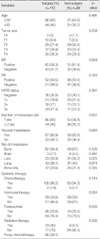Abstract
Purpose
The main treatment for stage IV breast cancer is currently systemic therapy. Surgical resection of the primary tumor is usually done for treating the tumor-related complications. Recent studies have suggested that surgery may improve the long-term survival of stage IV breast cancer patients. We evaluated the impact of the primary surgical resection site on the survival of stage IV breast cancer patients.
Methods
We reviewed the records of the stage IV breast cancer patients who were treated at Seoul University Hospital between April 1992 and December 2007. The tumor and clinical characteristics, the type of treatments and the overall survival were compared between the surgically versus nonsurgically treated patients.
Results
Of the 198 identified patients, 110 (55.8%) received surgical excision of their primary tumor and 88 (44.2%) did not. The mean survival was 67 months vs. 42 months for the surgically treated patients vs. the patients without surgery, respectively (p=0.0287). On a multivariate analysis with using the Cox model and after adjusting for the estrogen receptor status, visceral metastases, the number of metastatic sites and trastuzumab treatment, surgery was an independent factor for improved survival (hazard ratio, 0.55; 95% confidence interval, 0.31-0.97; p=0.041).
Figures and Tables
 | Figure 1Unadjusted overall survival by surgery status. Kaplan-Meier survival curves for surgery and non-surgery groups are shown. |
 | Figure 2Adjusted overall survival by surgery status. Survival curves are derived from Cox model, adjusted for surgery status, estrogen receptor, visceral metastases, number of metastatic sites and trastuzumab treatment. |
References
1. Korean Breast Cancer Society. Breast cancer facts & figures 2006-2008. 2008. Vol. 1. Seoul: Korean Breast Cancer Society;5–7.
2. Breast cancer treatment (PDQ): stage IIIB, inoperable IIIC, IV, recurrent, and metastatic breast cancer. National Cancer Institute. accessed July 25th, 2009.
http://www.cancer.gov/cancertopics/pdq/treatment/breast/HealthProfessional/page8.
3. Fisher B, Gunduz N, Coyle J, Rudock C, Saffer E. Presence of a growth-stimulating factor in serum following primary tumor removal in mice. Cancer Res. 1989. 49:1996–2001.
4. O'Reilly MS, Holmgren L, Shing Y, Chen C, Rosenthal RA, Moses M, et al. Angiostatin: a novel angiogenesis inhibitor that mediates the suppression of metastases by a Lewis lung carcinoma. Cell. 1994. 79:315–328.
5. Khan SA, Stewart AK, Morrow M. Does aggressive local therapy improve survival in metastatic breast cancer? Surgery. 2002. 132:620–626.

6. Rapiti E, Verkooijen HM, Vlastos G, Fioretta G, Neyroud-Caspar I, Sappino AP, et al. Complete excision of primary breast tumor improves survival of patients with metastatic breast cancer at diagnosis. J Clin Oncol. 2006. 24:2743–2749.

7. Babiera GV, Rao R, Feng L, Meric-Bernstam F, Kuerer HM, Singletary SE, et al. Effect of primary tumor extirpation in breast cancer patients who present with stage IV disease and an intact primary tumor. Ann Surg Oncol. 2006. 13:776–782.

8. Gnerlich J, Jeffe DB, Deshpande AD, Beers C, Zander C, Margenthaler JA. Surgical removal of the primary tumor increases overall survival in patients with metastatic breast cancer: analysis of the 1988-2003 SEER data. Ann Surg Oncol. 2007. 14:2187–2194.

9. Fields RC, Jeffe DB, Trinkaus K, Zhang Q, Arthur C, Aft R, et al. Surgical resection of the primary tumor is associated with increased long-term survival in patients with stage IV breast cancer after controlling for site of metastasis. Ann Surg Oncol. 2007. 14:3345–3351.

10. Bafford AC, Burstein HJ, Barkley CR, Smith BL, Lipsitz S, Iglehart JD, et al. Breast surgery in stage IV breast cancer: impact of staging and patient selection on overall survival. Breast Cancer Res Treat. 2009. 115:7–12.

11. Blanchard DK, Shetty PB, Hilsenbeck SG, Elledge RM. Association of surgery with improved survival in stage breast cancer patients. Ann Surg. 2008. 247:732–738.

12. Ragaz J, Jackson SM, Le N, Plenderleith IH, Spinelli JJ, Basco VE, et al. Adjuvant radiotherapy and chemotherapy in node-positive premenopausal women with breast cancer. N Engl J Med. 1997. 337:956–962.

13. Overgaard M. Overview of randomized trials in high risk breast cancer patients treated with adjuvant systemic therapy with or without post-mastectomy irradiation. Semin Radiat Oncol. 1999. 9:292–299.

14. Early Breast Cancer Trialists' Collaborative Group (EBCTCG). Effects of radiotherapy and of differences in the extent of surgery for early breast cancer on local recurrence and 15-year survival: an overview of the randomized trials. Lancet. 2005. 366:2087–2106.
15. Hotta T, Takifuji K, Arii K, Yokoyama S, Matsuda K, Higashiguchi T, et al. Potential predictors of long-term survival after surgery for patients with stage IV colorectal cancer. Anticancer Res. 2006. 26:1377–1383.
16. Flanigan RC, Salmon SE, Blumenstein BA, Bearman SI, Roy V, McGrath PC, et al. Nephrectomy followed by interferon alfa-2b compared with interferon alfa-2b alone for metastatic renal-cell cancer. N Engl J Med. 2001. 345:1655–1659.

17. Doglietto GB, Pacelli F, Caprino P, Alfieri S, Carriero C, Malerba M, et al. Palliative surgery for far-advanced gastric cancer: a retrospective study on 305 consecutive patients. Am Surg. 1999. 65:352–355.
18. Dauplat J, Le Bouëdec G, Pomel C, Scherer C. Cytoreductive surgery for advanced stages of ovarian cancer. Semin Surg Oncol. 2000. 19:42–48.

19. Demicheli R, Valagussa P, Bonadonna G. Does surgery modify growth kinetics of breast cancer micrometastases? Br J Cancer. 2001. 85:490–492.

20. Bland KI. The Breast: comprehensive management of benign and malignant disease. 1998. Vol 2:2nd ed. Philadelphia: WB Saunders.
21. Andre F, Slimane K, Bachelot T, Dunant A, Namer M, Barrelier A, et al. Breast cancer with synchronous metastases: trends in survival during a 14 year period. J Clin Oncol. 2004. 22:3302–3308.





 PDF
PDF ePub
ePub Citation
Citation Print
Print







 XML Download
XML Download